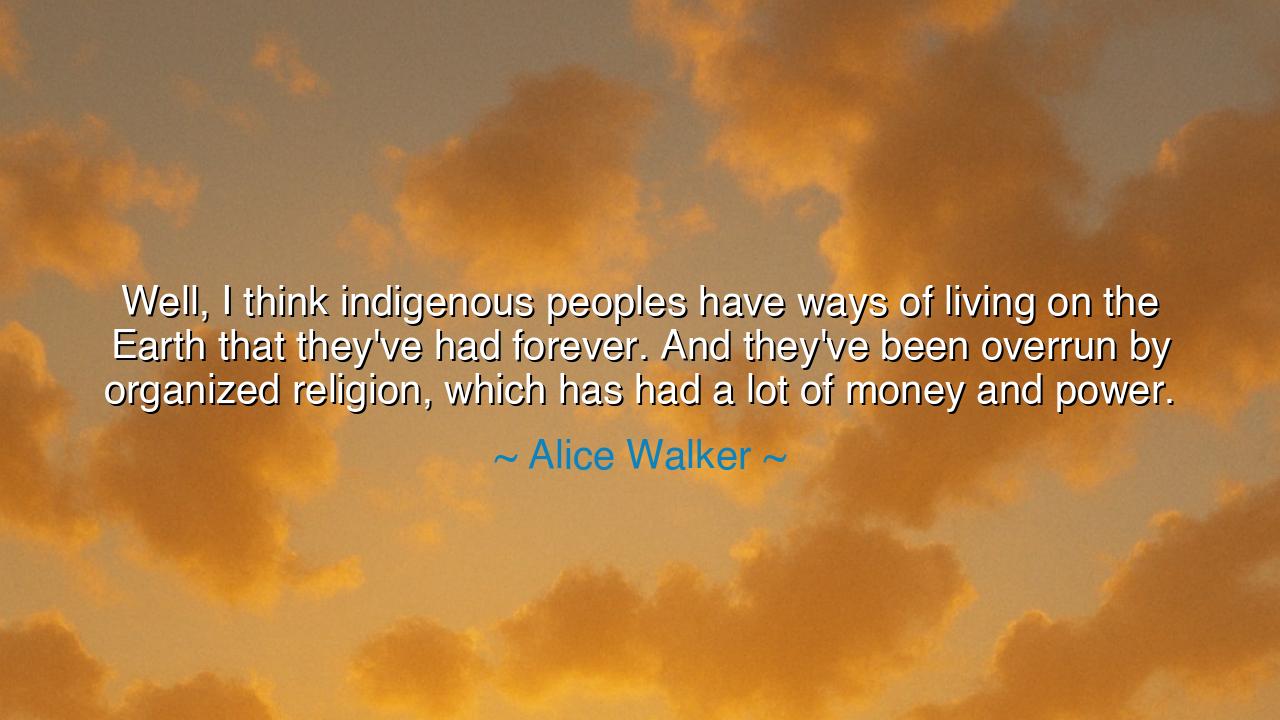
Well, I think indigenous peoples have ways of living on the Earth
Well, I think indigenous peoples have ways of living on the Earth that they've had forever. And they've been overrun by organized religion, which has had a lot of money and power.






Alice Walker, poet of truth and defender of the brokenhearted, once declared: “Well, I think indigenous peoples have ways of living on the Earth that they've had forever. And they've been overrun by organized religion, which has had a lot of money and power.” In these words she unveils a sorrowful reality—that the wisdom of the indigenous peoples, ancient and rooted in harmony with the earth, was trampled under the march of conquest, wealth, and dogma. Her voice does not merely lament; it cries out as a witness of history, reminding us that civilizations built on reverence for the land were often silenced by institutions that sought dominion rather than communion.
The ancients knew that the earth itself was alive. To the Lakota, the Great Spirit breathed in every creature; to the Andean peoples, the mountains were gods, the rivers sacred veins of life; to the Aboriginal peoples of Australia, the Dreamtime bound the people to the land in a web of spirit and memory. These ways of living on the Earth were not doctrines to control, but practices to sustain balance and survival. They were not inwardly focused systems of power, but outwardly lived relationships of respect. It is this harmony that Walker praises, and it is this harmony that was broken by the advance of empires and churches clothed in authority.
Consider the story of the Spanish conquest of the Americas. The indigenous civilizations—Aztec, Maya, Inca—held profound spiritual traditions tied to the cycles of nature and the rhythms of the cosmos. But with the arrival of colonizers came missionaries, backed by wealth and weapons. Organized religion, allied with empire, demanded conversion, tore down temples, built cathedrals upon sacred sites, and outlawed ancient practices. What had endured for centuries “forever” was overrun, not by superior wisdom, but by sheer force coupled with money and power.
Yet, O listener, do not hear only tragedy in Walker’s words. Hear also the resilience of the indigenous spirit. For though many traditions were suppressed, they were never extinguished. The songs of the elders remain, the rituals continue in secret or in revival, and the reverence for earth, sky, and spirit still flows in the veins of native peoples today. They endure as living testimony that wisdom rooted in balance cannot be utterly destroyed, even when organized religion seeks to erase it.
Walker’s lament is also a warning to us all. When faith becomes entangled with wealth and authority, it forgets the very essence of spirituality: humility, reverence, and care for life. When power crushes the small voices of those who walk gently on the earth, humanity loses not only cultures, but the very wisdom it needs to survive. For in this age of climate crisis, it is precisely the ways of living on the Earth preserved by indigenous peoples that may hold the key to healing the planet.
The lesson is clear: honor the wisdom of those who lived close to the soil, who saw the divine in every stone and stream. Do not despise their traditions as primitive, nor dismiss their voices as weak. Instead, learn from them: to live simply, to give thanks for what is taken, to walk lightly upon the land. Recognize that wealth and power, when allied with religion or politics, can destroy, but humility and reverence can sustain.
Practical wisdom flows from this: seek out the teachings of indigenous peoples with respect. Support their rights to land, language, and culture. When you walk in nature, remember that you stand upon sacred ground, tended by countless generations before you. Examine your own faith or philosophy, and ask whether it serves life or merely sustains itself. Choose reverence over greed, balance over domination, compassion over conquest.
So remember, O children of tomorrow: the indigenous ways of living on the Earth are not relics of the past, but seeds of the future. Do not let them be silenced again by the clamor of money and power. Instead, listen, learn, and walk beside them. For only when humanity remembers how to live with the earth, and not against it, will life remain beautiful and enduring for generations yet to come.






AAdministratorAdministrator
Welcome, honored guests. Please leave a comment, we will respond soon